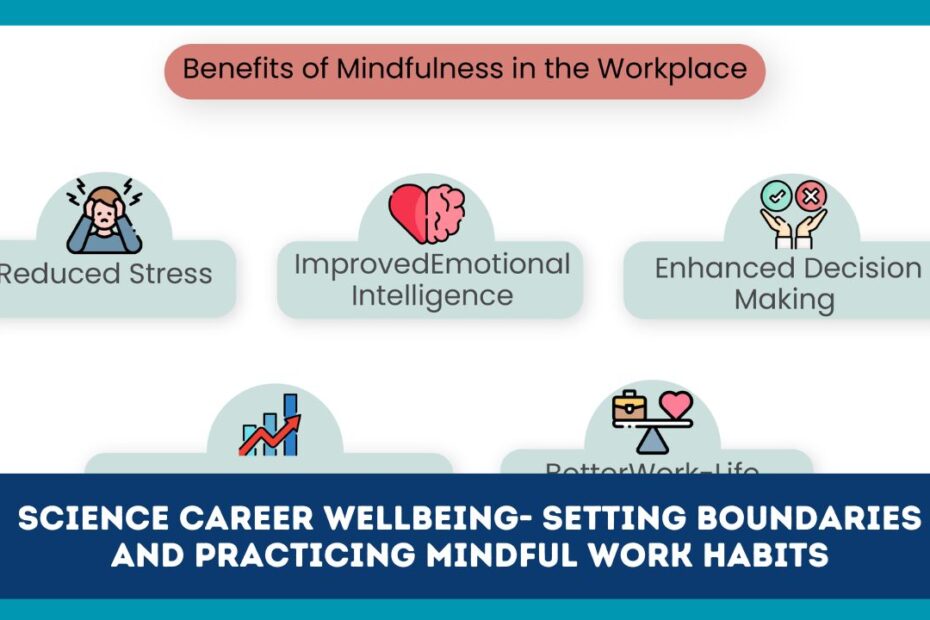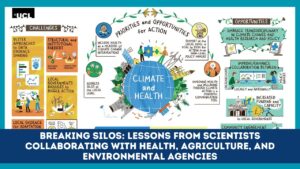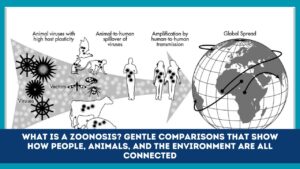Research culture often blurs lines between work and life: long experiments, late-night analyses, and relentless inboxes. Evidence shows mental health strain is widespread among researchers.
A Nature survey of 6,320 PhD students found 36% sought help for anxiety or depression related to their studies, highlighting systemic pressure in academia.Recent work in Australia similarly reported 45% moderate–severe depression and 39% moderate–severe anxiety among PhD students.
At the same time, after-hours digital work—especially email and messaging—predicts emotional exhaustion, eroding recovery time crucial for high-cognition tasks common in science careers.
The mindful habits that move the needle
The good news: targeted habits and organizational norms measurably reduce stress without sacrificing output.
- Mindfulness training: A 2025 randomized trial at a large academic medical center found a brief, digital mindfulness program reduced general and work-related stress—a practical fit for busy labs.
- Shorter, smarter weeks: In the UK’s landmark four-day-week pilot (61 organizations; ~2,900 workers), burnout dropped 71% and stress 39%, while revenue slightly increased (~1.4%); most firms kept the policy after the trial.
- Protected disconnection: Scholarship and policy trend toward a “right to disconnect” to protect recovery time—aligning with evidence that off-hours communication undermines detachment and increases stress.
Quick-start boundary plan for scientists
- Define lab-wide communication windows (e.g., 8:30–6:00) and use delayed-send outside those hours to normalize recovery. Evidence links after-hours email to emotional exhaustion.
- Adopt a mindful micro-practice at task switches (60–90 seconds of breath or body-scan). Digital mindfulness reduces work stress and fits between bench and analysis.
- Batch deep work: Reserve 2–3 uninterrupted blocks weekly; protect with shared calendars. (High-cognition work benefits most from fewer, higher-quality hours.)
- Pilot a focus-friendly schedule: Try a “9-day fortnight” or four-day rotation during low-risk periods; measure burnout, focus, and output. UK pilots show stress and sick days drop without productivity loss.
- Nurture nature breaks: Short outdoor walks support mental health determinants—useful when experiments run long.
Evidence snapshot & how to apply it
| Finding (evidence) | What it means for scientists | Action you can take this month |
|---|---|---|
| 36% of PhD students sought help for anxiety/depression (Nature survey) | Distress is common, not a personal failing | Add mental health check-ins to lab meetings; publish support resources on your lab wiki |
| 71% lower burnout, 39% lower stress in UK 4-day trial; revenue up ~1.4% | Shorter hours can maintain output and improve wellbeing | Trial shorter hours during grant-light weeks; track output and wellbeing metrics |
| After-hours email ↗ emotional exhaustion | Constant connectivity erodes recovery | Set a lab “no-send” window; use scheduled send for exceptions |
| Brief digital mindfulness program ↓ work stress (RCT) | Micro-practices are effective and scalable | Begin 2×/day 2-minute resets; invite lab-wide participation |
| PhD cohorts show high depression/anxiety (Australia 2024) | Early-career scientists are especially at risk | Pair newcomers with mentors trained in boundary-setting |
Healthy boundaries and mindful work habits aren’t luxuries—they’re performance tools. By limiting after-hours communication, adding micro-mindfulness, and piloting smarter schedules, science teams can lower burnout, protect cognition, and sustain output.
Start small, measure outcomes, and make wellbeing a lab standard—not an individual burden.



